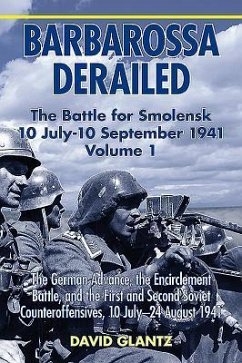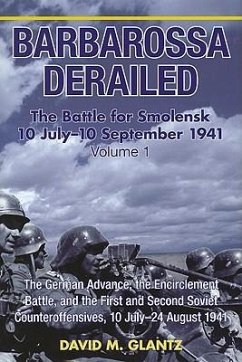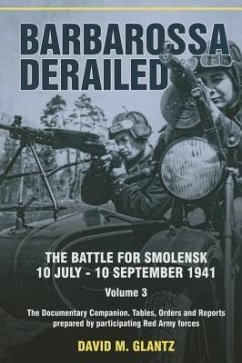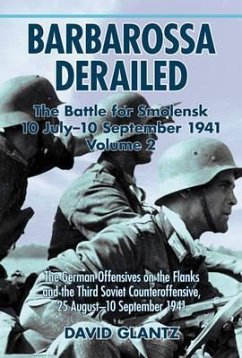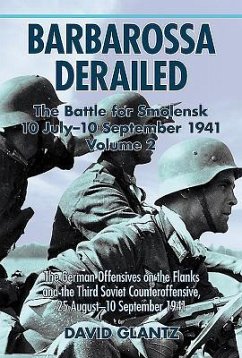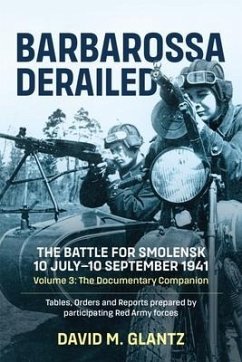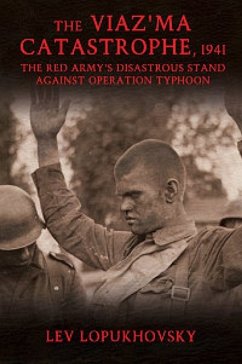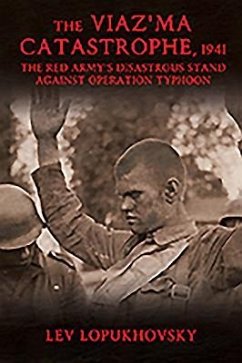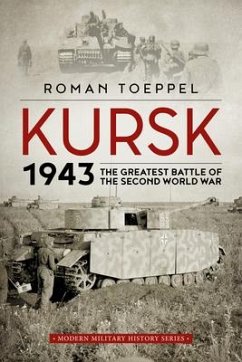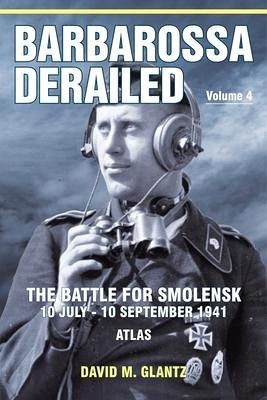
David M. Glantz
Broschiertes Buch
Barbarossa Derailed: The Battle for Smolensk 10 July-10 September 1941 - Volume 4
Atlas
Versandkostenfrei!
Versandfertig in 2-4 Wochen

PAYBACK Punkte
28 °P sammeln!




At dawn on 10 July 1941, massed tanks and motorized infantry of German Army Group Center's Second and Third Panzer Groups crossed the Dnepr and Western Dvina Rivers, beginning what Adolf Hitler, the Fuhrer of Germany's Third Reich, and most German officers and soldiers believed would be a triumphal march on Moscow, the capital of the Soviet Union.
David M. Glantz is an American military historian and the editor of The Journal of Slavic Military Studies. Glantz holds degrees in history from the Virginia Military Institute and the University of North Carolina at Chapel Hill and is a graduate of the U.S. Army Command and General Staff College, Defense Language Institute, Institute for Russian and Eastern European Studies, and U.S. Army War College. He began his military career in 1963 as a field artillery officer from 1965 to 1969 and served in various assignments in the United States and Vietnam during the Vietnam War with the II Field Force Fire Support Coordination Element (FSCE) at the Plantation in Long Binh. After teaching history at the United States Military Academy from 1969 through 1973, he completed the army's Soviet foreign area specialist program and became chief of Estimates in US Army Europe's Office of the Deputy Chief of Staff for Intelligence. Upon his return to the United States in 1979, he became chief of research at the Army's newly formed Combat Studies Institute at Fort Leavenworth, Kansas, and then Director of Soviet Army Operations at the Center for Land Warfare, U.S. Army War College in Carlisle, Pennsylvania. While at the College, Col. Glantz was instrumental in conducting the annual "Art of War" symposia which produced the best analysis of the conduct of operations on the Eastern Front during the Second World War in English to date. The symposia included attendance of several former German participants in the operations and resulted in publication of the seminal transcripts of proceedings. Returning to Fort Leavenworth in 1986, he helped found and later directed the U.S. Army's Soviet (later Foreign) Military Studies Office (FMSO), where he remained until his retirement in 1993 with the rank of Colonel. In 1993 he established The Journal of Slavic Military Studies, a scholarly journal for which he still serves as chief editor, that covers military affairs in the states of Central and Eastern Europe as well as the former Soviet Union. In recognition of his work, he has received several awards, including the Society of Military History's prestigious Samuel Eliot Morrison Prize for his contributions to the study of military history. Glantz is regarded by many as one of the best western military historians of the Soviet role in World War II. He lives with his wife Mary Ann Glantz in Carlisle, Pennsylvania.
Produktdetails
- Verlag: Helion & Company
- Reprint
- Seitenzahl: 152
- Erscheinungstermin: 20. Juni 2022
- Englisch
- Abmessung: 240mm x 265mm x 12mm
- Gewicht: 580g
- ISBN-13: 9781915070999
- ISBN-10: 1915070996
- Artikelnr.: 62754094
Herstellerkennzeichnung
Libri GmbH
Europaallee 1
36244 Bad Hersfeld
gpsr@libri.de
Für dieses Produkt wurde noch keine Bewertung abgegeben. Wir würden uns sehr freuen, wenn du die erste Bewertung schreibst!
Eine Bewertung schreiben
Eine Bewertung schreiben
Andere Kunden interessierten sich für


